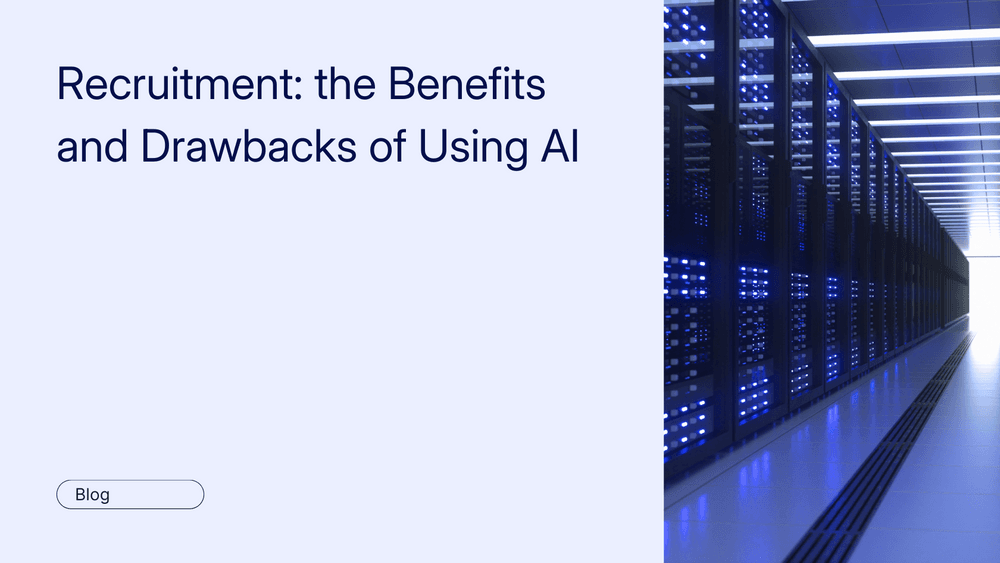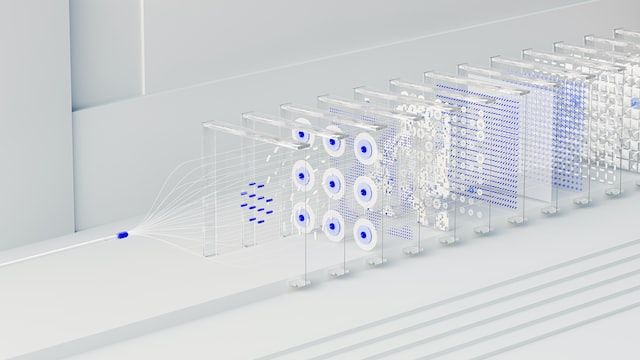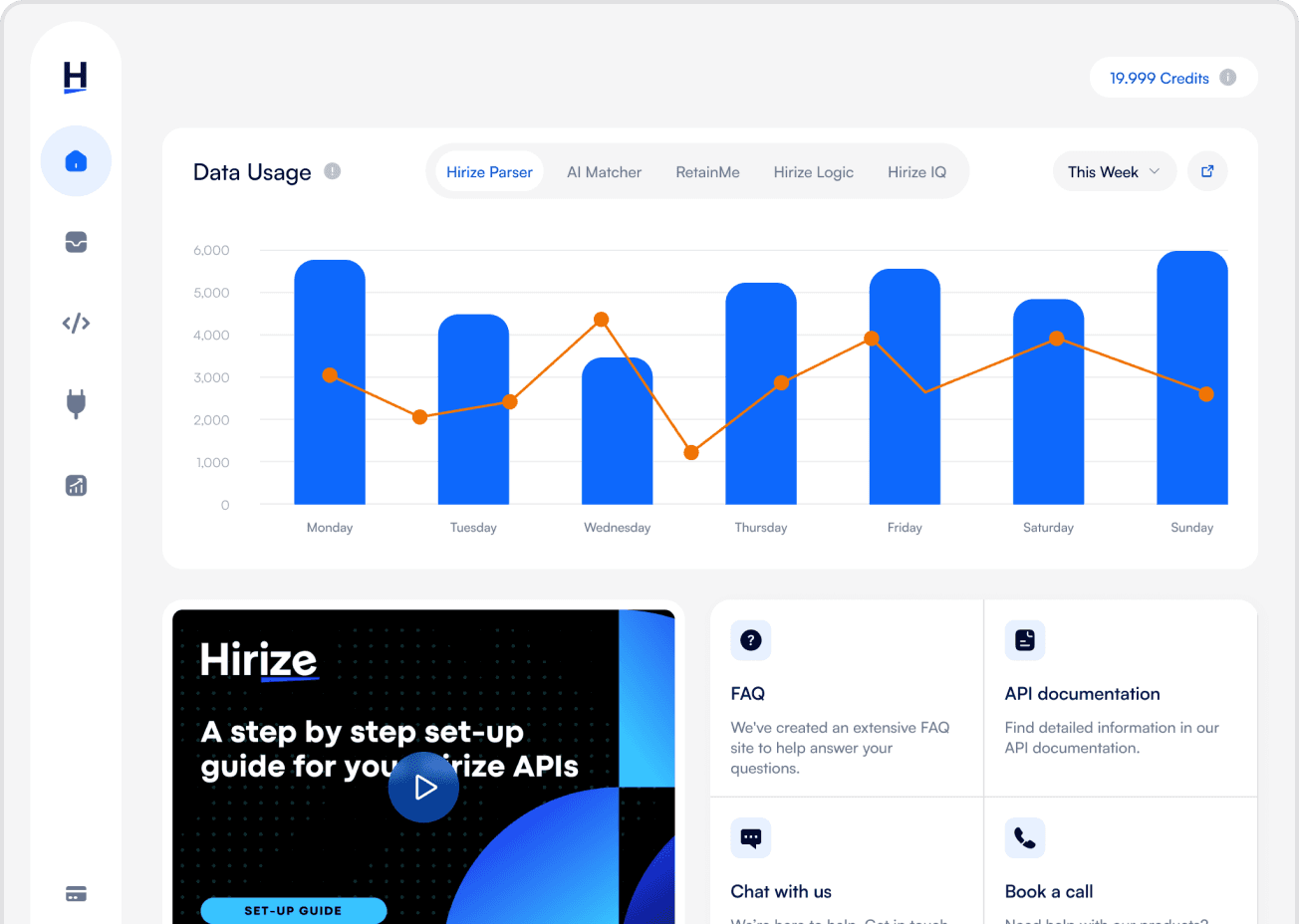superpowers?
Recruitment: the Benefits and Drawbacks of Using AI
In this article, we'll explore AI recruitment and its advantages and potential dangers.

AI recruitment has become a hot topic as AI-based resume parser software is gaining in popularity. AI can be leveraged to help streamline the hiring process, offering advantages such as improved accuracy and efficiency when it comes to selecting the right candidates for job openings. However, AI recruitment also carries potential risks that must be carefully considered before embracing its use in the hiring process. In this article, we'll explore AI recruitment and its potential advantages and dangers. Read on to learn more about AI-based resume parser software and what it can mean for your company.

Enterprise-level AI systems
AI systems can interpret job descriptions, review resumes, and analyze skillsets to determine the best-suited candidates for a role. AI recruitment technology can simplify cumbersome tasks such as matching candidates to available positions, while also selecting those who are most likely to succeed in the position. AI recruitment is making it easier than ever before to find the right person for the job quickly and efficiently. However, there are potential downsides to AI recruitment that organizations should consider as well. AI can be vulnerable to bias and inaccurate results, so it's important to ensure AI systems are properly trained before putting them into action. Additionally, AI-based resume parser software may not be able to pick up on more subtle qualifications that might make a candidate more suitable for a role, such as intangible skills or personality traits. AI recruitment should be used in conjunction with traditional methods of hiring to ensure the best outcome when it comes to finding great employees.
Overall, AI-based resume parser software is an increasingly popular and effective way to find talented people for open roles. AI recruitment offers the potential for improved accuracy, speed, and efficiency when it comes to finding the right candidates. However, AI-based resume parser software should always be used in conjunction with traditional methods of hiring to ensure the best outcome. Careful consideration must also be given to AI recruitment systems in order to prevent bias or inaccurate results from occurring. AI recruitment has a place in the future of hiring, but it's important to be aware of both its advantages and potential risks.
Artificial intelligence-assisted recruitment
AI-assisted recruitment is an AI-based technology that can help find the right candidate for a job quickly and accurately. AI systems can analyze resumes, match candidates to open roles and identify those who are most likely to succeed in the position. AI-assisted recruitment also offers greater efficiency when it comes to finding great employees; AI-assisted recruitment can identify the best candidates in a fraction of the time it would take using traditional methods. AI-assisted recruitment can also help to reduce bias and ensure accurate results, depending on how the AI system is trained. AI for recruitment is the ability to use technology to choose the best applicants for open positions and automate the more tedious parts of the hiring process. AI tools like Hirize can speed up the process of information extraction, automate the completion of application forms, and save reams of data in the database. AI can also identify the difference between different types of structures, words, and pictures, and it can aid in the analysis of information about one's own career, education, and skills. AI can be used to automate the recruitment process, making it better at each step and guaranteeing excellent selection for both the applicant and the firm. It also frees up more time by letting the recruiter delegate tasks and get assistance as needed.
Positive Aspects of AI and What They Can Do For Us
AI recruitment systems can improve efficiency, accuracy, and speed when it comes to finding the best candidates for a job.
AI and technological advancement
AI provides benefits over rivals regardless of the availability of jobs, such as insights into trends in the labor market, the availability of relevant talents, and avenues for future expansion.
AI technology has the potential to make recruitment processes more efficient and accurate while reducing bias and increasing speed when it comes to finding great candidates. AI can help identify patterns that traditional methods may overlook. AI-based resume parser software can quickly and accurately extract data from resumes, allowing recruiters to focus their efforts on assessing the candidates for the role rather than spending significant time extracting data from resumes. AI can also help to pick up on more subtle qualifications that might make a candidate more suitable for a role, such as intangible skills or personality traits. AI recruitment should be used in conjunction with traditional methods of hiring to ensure the best outcome when it comes to finding great employees.
AI helps you save time
AI can be used to reduce the time and effort required to recruit and screen qualified applicants, allowing recruiters to better handle other operations such as interviews, selection tests, and onboarding without having to individually analyze each candidate.
AI-based recruitment technologies can also save time, as AI systems can automate tedious tasks such as resume review and candidate assessment. AI-assisted recruitment enables recruiters to more quickly and accurately identify the best candidates for a position, freeing up their time to focus on other aspects of the hiring process. AI helps you find high-quality candidates that may have been overlooked with traditional methods. AI-assisted recruitment can also be used to identify patterns in resumes, such as preferences for certain experiences, that recruiters may not notice.
Working Together with AI
AI can be used to improve existing processes and make them more efficient, accurate, and effective. AI recruitment should be used in conjunction with traditional methods of hiring to ensure the best outcome when it comes to finding great employees. AI provides greater efficiency when it comes to analyzing candidate resumes and selecting the right candidates for a job; however, AI cannot replace the human touch completely. AI-assisted recruitment should be used to enhance processes, not replace them. AI can assist applicants by providing insights into the job market and help recruiters make informed decisions when it comes to hiring the right candidates. AI also has the potential to improve areas such as onboarding, performance management, and career development by helping identify talent and providing AI assistance to help develop careers.
AI can be a valuable tool in the hiring process, as it provides a resource from which applicants can get answers to their inquiries at any time of day or night. It can also offer suggestions or connections to resources that will aid in the comprehension of the decision-making process. Active collaboration is also possible, which speeds up the process and benefits everyone involved.
Potential Negative aspects of AI and how to deal with them
We have only touched on the pros of AI thus far, but there are also potential drawbacks, some of which may turn out to be opportunities. Let's check out what they are.
Will AI eventually replace human workers?
AI can free up human workers from mundane, repetitive duties and position them in situations where their creativity, compassion, and attentiveness are valued. AI does not eliminate jobs but rather frees up human resources professionals to take on more complex assignments. AI can be used to assess a large pool of candidate data, freeing up recruiters to use their expertise in the selection process. AI should not be seen as replacing humans but rather as complementing them.
AI can be susceptible to bias. AI systems learn from the data they are given, so if there is bias in the training data AI will replicate it in its decisions. Humans should remain involved to help recognize and counteract this potential source of error. AI can also have difficulty recognizing certain qualifications that may not be apparent on a resume, such as communication and problem-solving skills. AI recruitment should be used in conjunction with traditional methods of candidate assessment to balance out AI decisions.
Effects of cognitive bias on the hiring process
AI has the potential to eliminate cognitive bias, but it is up to human resources to ensure it does not institutionalize harmful practices. AI systems should be designed to recognize and address any potential bias in the training data. Human resources professionals need to ensure AI is not relying on outdated or discriminatory criteria when making decisions. AI can also help identify candidates who have been overlooked because of their race, gender, age, or other characteristics that may lead to unconscious bias. AI can be used to create unbiased hiring processes when combined with human judgment. AI recruitment should always be implemented in tandem with traditional methods and supervised by professionals who understand the nuances of the recruitment process.
Have we seen AI's human side yet?
When AI is used in recruitment, it should not be seen as a replacement for human decision-making. AI can provide valuable insights into job market trends and help recruiters use their expertise to make the best hiring decisions. AI can assist applicants by providing resources to understand the selection process and offering advice or connections to other relevant information. AI also has the potential to reduce the time and effort required for onboarding processes, allowing recruiters to focus on linking candidates with suitable positions. AI can even provide personalized career development opportunities based on an individual's skills, goals, and interests. AI is quickly becoming an invaluable asset for human resources professionals and should be viewed as a partner rather than a replacement in the recruitment process.

AI has potential drawbacks, such as the 'dehumanization of labor' and human resources becoming less invested in the hiring process. However, if HR approaches AI with people in mind, encourages participation, and strives to improve procedures, the benefits outweigh the drawbacks.
In conclusion, AI recruitment can offer a wide range of benefits for human resources professionals and job seekers alike. AI can help managers identify qualified candidates quickly and accurately, reduce cognitive bias in hiring decisions, and provide personalized career development opportunities. AI should be seen as a complement to existing recruitment processes rather than a replacement for humans. With careful implementation and supervision, AI can help make the recruitment process more efficient and accessible for all.
AI is transforming recruitment for the better, and Hirize is at the forefront of AI-powered hiring. Click here to take advantage of AI's potential for your organization, and hire top talent fast!
Begin hiring with AI today - sign up with Hirize now!
superpowers?



